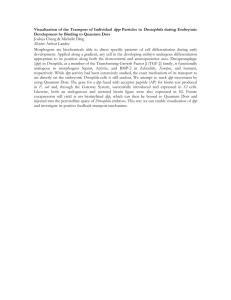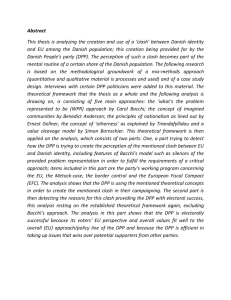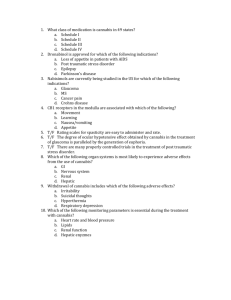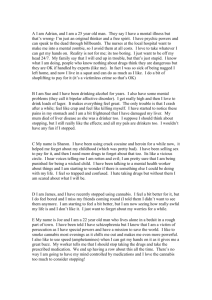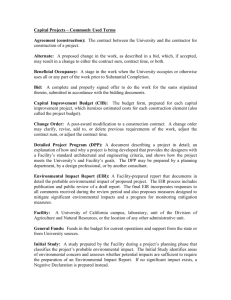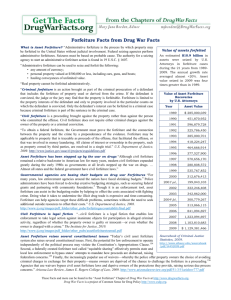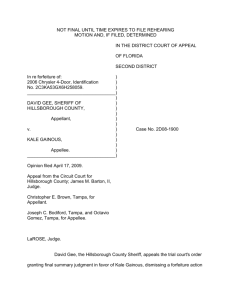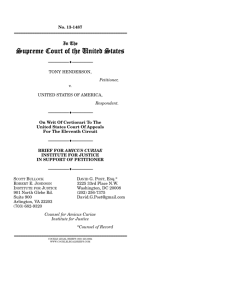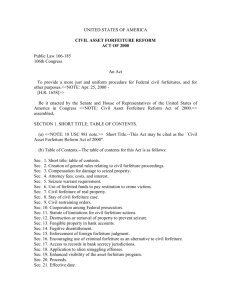ASSET CONFISCATION UPDATE - Confiscation and Proceeds of
advertisement
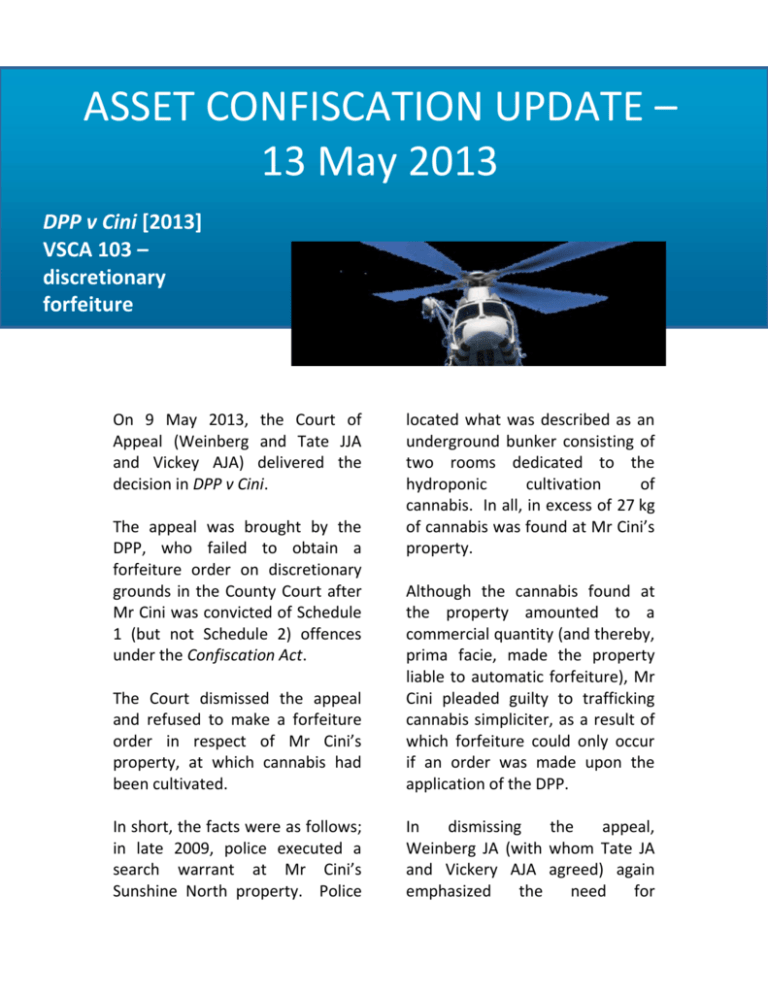
ASSET CONFISCATION UPDATE – 13 May 2013 DPP v Cini [2013] VSCA 103 – discretionary forfeiture On 9 May 2013, the Court of Appeal (Weinberg and Tate JJA and Vickey AJA) delivered the decision in DPP v Cini. The appeal was brought by the DPP, who failed to obtain a forfeiture order on discretionary grounds in the County Court after Mr Cini was convicted of Schedule 1 (but not Schedule 2) offences under the Confiscation Act. located what was described as an underground bunker consisting of two rooms dedicated to the hydroponic cultivation of cannabis. In all, in excess of 27 kg of cannabis was found at Mr Cini’s property. The Court dismissed the appeal and refused to make a forfeiture order in respect of Mr Cini’s property, at which cannabis had been cultivated. Although the cannabis found at the property amounted to a commercial quantity (and thereby, prima facie, made the property liable to automatic forfeiture), Mr Cini pleaded guilty to trafficking cannabis simpliciter, as a result of which forfeiture could only occur if an order was made upon the application of the DPP. In short, the facts were as follows; in late 2009, police executed a search warrant at Mr Cini’s Sunshine North property. Police In dismissing the appeal, Weinberg JA (with whom Tate JA and Vickery AJA agreed) again emphasized the need for proportionality between the offending and its consequences. Weinberg JA referred to the observations of Chief Justice Warren in DPP v Tran [2004] VSC 218, in which her Honour observed that “forfeiture seems disproportionate to the consequences of forfeiture”. Although the DPP has now attempted on numerous occasions to obtain discretionary forfeiture orders in respect of real estate, such applications have so far been unsuccessful. See DPP v Smith [2007] VSC 98; DPP v Gyurcik [2007] VSC 424; DPP v Nikolaou [2008] VSC 111. Kinealy v DPP [2013] VSC 67 On 27 February 2013, J Forrest J delivered his decision in Kinealy v DPP. In that case, the DPP sought a civil forfeiture order over a property used to cultivate cannabis. Mr Kinealy had an interest in the property but was not charged or convicted with any offences relating to the cultivation of cannabis. Mr Kinealy sought an exclusion order in respect of his interest from the restraining order and, also, opposed the DPP’s application for forfeiture on the grounds of hardship (hardship is a ground upon which a court can refuse to make a civil forfeiture order but it is inapplicable in the context of automatic forfeiture). The Court found that the property was clearly tainted property, it having been used in connection with the cultivation of cannabis. His Honour found, at [35], that “Absent the property the cannabis seedlings could not have been cultivated. The master bedroom contained a hydroponic cannabis set-up, which included grow lights, power transformations (sic), plant nutrients, a power timer, a charcoal filter and grow tubs.” Further, the Court found that Mr Kinealy could not demonstrate that he was not, in any way, involved in the commission of the cultivation of cannabis. In fact, it was found that Mr Kinealy’s evidence was false (at [51]). That being so, Mr Kinealy’s application for exclusion was dismissed. However, since it was a civil forfeiture proceeding (as opposed to automatic forfeiture), Mr Kinealy was able to contend that a forfeiture order ought not be made by reason of the hardship that it would cause him. necessary to obtain relief on the grounds of hardship. In refusing to make the forfeiture order on the ground of hardship, J Forrest J stated, at [67]: “If a [civil forfeiture order] is made, then Mr Kinealy at the age of 49 forfeits his only real asset. He has very limited income. His employment prospects are dim. He had no involvement in the cultivation of the crop or in any plans to dispose of it. I do not see how such an order could have any true deterrent effect. Indeed, in my view it would be tantamount to punishment for a crime for which Mr Kinealy was not charged. Notwithstanding his unsatisfactory evidence on most issues, this is a case where the circumstances are such that I am satisfied that the hardship exception is made out.” On 20 July 2012, the Court of Appeal (Warren CJ, Buchanan AP and Beech AJA) delivered the decision in DPP v Moran. The decision is of particular interest since earlier authorities had pointed to the need to demonstrate something beyond ordinary hardship. See, for example, R v Winand (1994) 73 A Crim R 497. Hence, this authority might be seen as a lessening of the hurdle DPP v Moran [2012] VSCA 154 In that case, the DPP sought a forfeiture order over the proceeds of sale of a property in Ascot Vale, formerly owned by Judith Moran. The question for determination was whether the property was “tainted property”, namely whether it was used, or was intended by the accused to be used in, or in connection with, the commission of the murder of Desmond Moran. The relevant connection of the property with the murder was as follows; it was the base from which the murder was planned and discussed, the place at which the killer resided prior to the murder, the place used to conceal the murder weapon and the disguise worn by the killer, the place at which the getaway vehicle was parked and the security for a loan of monies from Westpac, which were used partly to reward the perpetrators in return for the killing. The case is significant in that it provides a detailed discussion of the requisite nexus between the offence and the property so as to render it used in or in connection with the commission of the offence (i.e. tainted property). In determining that the Ascot Vale property was not used in or in connection with the murder of Desmond Moran, the Court relied upon its reasoning in Chalmers v The Queen [2011] VSCA 436, in which the Court of Appeal engaged in a detailed analysis of the authorities from other jurisdictions around Australia (see [77FF]). However, where the relevant property is merely the location at which an offence occurs, such as, for example, the commission of a sexual offence, the answer is far less clear. In the case of sexual offences, premises have only been found to have been used in or in connection with the relevant offence where they were specifically equipped so as to lure victims to them. Further information For further information concerning litigation under the Confiscation Act 1997, visit www.confiscation.com.au. About the author The Court stated that in each case it is a question of fact and degree as to whether a particular property has been used in or in connection with the commission of the offence. When a property is used to hydroponically cultivate cannabis, there can be no question that the property was used in or in connection with the commission of the relevant offence. Christian Juebner is a barrister at the Victorian Bar. Christian practices in commercial law and confiscation litigation. Before coming to the Bar, Christian was a partner with Deacons (now Norton Rose). Christian can be contacted on: T (03) 9640 3216 M 0410 657 177 cjuebner@melbchambers.com.au Clerk: Barristers Logistics
